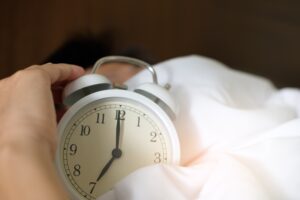Snoozen, Dormir, Schlaaf or Sleep: it’s one thing that we all need and its linked to our mental and emotional wellbeing. It is the foundation of good health.
The Importance of Sleep
Sleep is the centre of a revolving cycle that is critical to our mental wellbeing and yet sleep quality is often taken for granted. The effects of sleep deprivation can lead to depression, anxiety, bad decisions, lack of motivation, decreased physical health, and general lethargy and each one of these effects can themselves lead to a lack of sleep, creating a negative continuous cycle.
We will spend approximately 25 years of our lives sleeping, and incredibly an additional four years trying to get to sleep, so it’s clear that we need to develop a plan to maximise positive sleeping patterns.
So how do we do this?
What prevents us from having a good nights rest and how can we improve our relationship with our sleep? Poor sleep affects 32% of the population and there are four main factors that affect the quality of your sleep: (HEAL Paradox)

Health
Physical and mental health problems can stop us from achieving good sleep.
Environment
The place of sleep should be somewhere that we associate with rest and peace. Where possible, we should try to remove distractions, and be mindful of the presence of electronics, phones, tablets and TVs e.g. The backlit ‘blue light’ on our displays, suppress melatonin production and therefore enhances sleep disruption. Other important environmental factors are light, noise and temperature. Many people can over-think before sleeping in the form of worry and anxiety, especially when they are contemplating the day that’s been or the day that they are facing.
PRT
PRT or Progressive Relaxation Techniques can help you to unwind before going to sleep, therefore enhancing the potential of positive sleep and generating an effective routine. Techniques can include white noise, meditation, 4-7-8 breathing exercise, reading etc. PRT encourages a positive attitude, which can then help to break the negative cycle, and can help you to develop a healthier sleep pattern.
Lifestyle
There are a number of things that you can do every day to improve the quality of sleep. Food items such as rice, oats and dairy products can produce chemicals that increase our desire to sleep. Alcohol often impairs the quality of your sleep and makes you more likely to wake up during the night. Exercising on a regular basis is thought to help us sleep, however, it is important to exercise at the right time, to avoid increased adrenaline production, therefore making it more difficult to sleep.
In Summary
- Identify the HEAL factors that work for you.
- Establish a nightly routine that is specific to your needs.
- Stick to a set of habits that help you prepare you for rest each night.
It is the key to successful and effective behaviour and a quality way of life.
Interested in learning more? Contact us today to find out how we can help with your technical needs.
